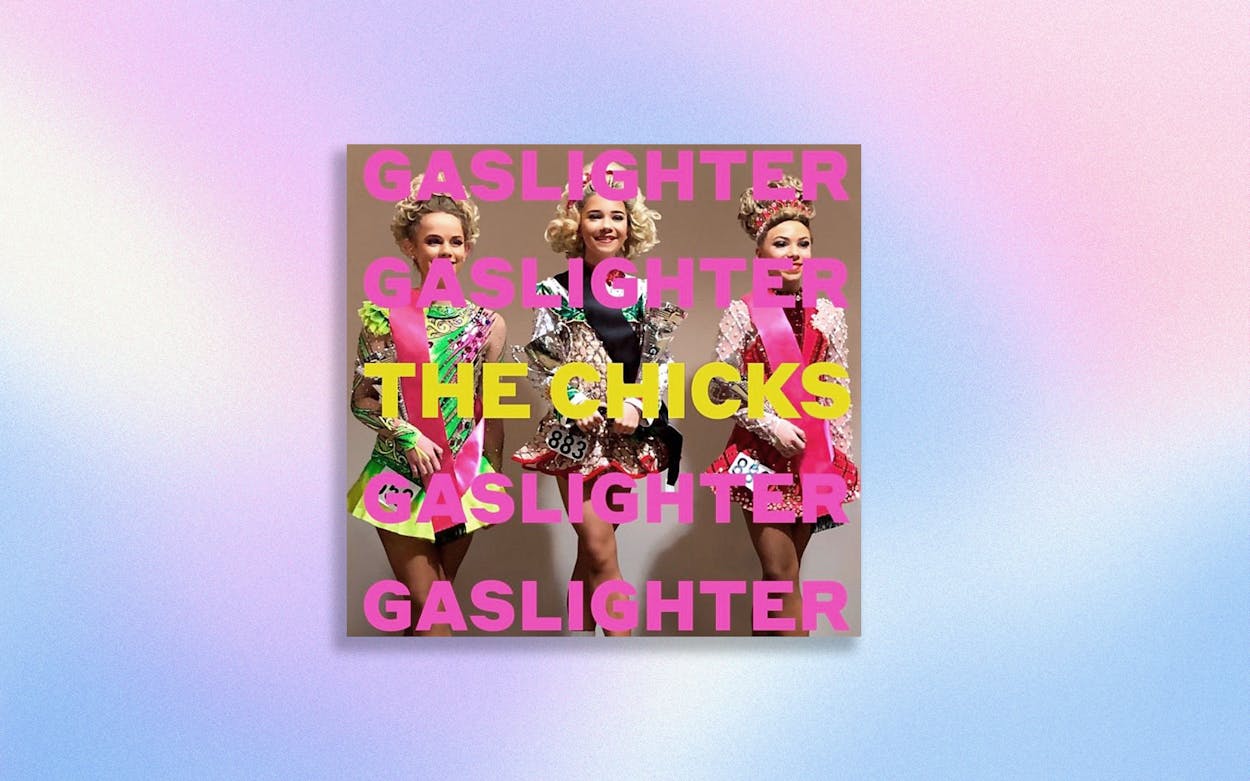Gaslighter, the new album from the Chicks, seems to be so ruthlessly honest about the end of Natalie Maines and (now ex-husband) Adrian Pasdar’s marriage that it might as well have been entitled F**k you, Adrian. The Chicks (Maines, and sisters Martie Maguire and Emily Strayer) never explicitly name Pasdar in the lyrics, but the titular gaslighter is described as an unsuccessful actor with a thing for boats, and the internet has collectively decided that Pasdar is the guy.
The Chicks do not pull punches here; the ex in question is selfish, insecure, disloyal, dishonest, and fairly pathetic. It’s not a good look. In her twangy soprano, Maines slings barbs like, “Hey, will your dad pay your taxes now that I’m done?” (“Tights on My Boat”) with glee. And, if the music video for the song “Sleep at Night” is any indication, Maguire and Strayer are right there by her side. It’s as if Gaslighter is the public relations version of the revenge fantasy that is “Goodbye Earl”; in these songs the Chicks don’t exactly murder the man who did Maines wrong, but they have certainly assassinated his character.
This is not unfamiliar territory for the Chicks, who, until changing their name last month, were best known as the massively popular country trio the Dixie Chicks. The cheating ex in Gaslighter bears great resemblance to the heartbreaker in “You Were Mine” present on the Chicks’ major-label debut album, Wide Open Spaces (1998). The narrator that Maines embodies in most of Gaslighter’s songs is also recognizable to anyone familiar with the Chicks’ discography: She’s hurt, angry, strong, sex-positive, vengeful, and deeply reflective. She also seems to be getting the last laugh.
In that way, Gaslighter aligns with the unique brand of feminist country upon which the Chicks established their legacy. The Chicks have always been eager to fight and talk back. It’s a trait that made them popular the world over and immensely meaningful to young women—like my friends and me—in the early aughts. Warmed up by the girl power of the Spice Girls, as well as the independent women of Destiny’s Child, we embraced the unapologetic sass of the Dixie Chicks, singing the lyrics of “Wide Open Spaces” and “Hello Mr. Heartache” into our hairbrushes at slumber parties for years on end. Their unapologetic nature is also, infamously, what almost tanked their legacy. They were boycotted by country radio stations across the nation after they told a London crowd they were “ashamed” that then-president George W. Bush was from their home state of Texas.
Gaslighter marks the return of the band after a recording hiatus that lasted more than fourteen years. On their last studio album, 2006’s Taking the Long Way, the Chicks told us they were “Not Ready to Make Nice,” and it seems that they still aren’t. But 2020 is even more primed for pointedly feminist country than the early aughts were, and some of the genre’s biggest stars—like Kacey Musgraves—have been outspoken about the dearth of women on country radio even now. To that end, Gaslighter brims with anthems about surviving in a world dominated by men, be they awful ex-husbands or the patriarchy at large. Up-tempo singles like “Gaslighter” and “Julianna Calm Down” drill home the message that you don’t need him like you think you do. And searing lyrics like “I hope you die peacefully in your sleep/ Just kidding, I hope it hurts like you hurt me” from “Tights on a Boat” will surely be sung into the hairbrushes of this next generation.
Gaslighter was coproduced by Jack Antonoff, an indie-pop wunderkind who built his career on anthemic hits like fun’s “We Are Young,” Taylor Swift’s “Out of the Woods,” and Sara Bareilles’s “Brave.” (He also coproduced fellow-Texan St. Vincent’s album Masseduction.) In this way, the Chicks have seamlessly adapted themselves to the year 2020. But I could not listen to the album without thinking almost exclusively of the past.
Nostalgia is unavoidable when a beloved band returns from a long hiatus, of course, but the subject matter of Gaslighter itself—a postmortem on a relationship that spanned two decades—is an exercise in reflection. As Natalie Maines looks back on her life to better understand her present and plan for her future, I found myself feeling similarly reflective. As I listened to “Julianna Calm Down” I found myself thinking about “Wide Open Spaces” and what a revelation those lyrics—about finding “room to make her big mistakes”—were to me at the age of twelve. Heartfelt ballads like “Young Man” and “Everybody Loves You” made me want to listen to the Dixie Chicks’s somber cover of Patty Griffin’s “Let Him Fly,” the last song on their second album. I had that song stuck in my head for the entirety of January 31, 1999—it helped ring in a brand new millennium, and it was the soundtrack to first time I got tipsy on champagne and made out with a boy.
My deep and historical attachment to the Chicks’ sound—Emily’s banjo, Martie’s violin, Natalie’s salty vocal runs, and their airy three-way harmonizing—made listening to Gaslighter both a joy and, frankly, a bit of a disappointment. The new songs are sweet and sharp, and feel both appropriately modern and yet classically on brand, but there really isn’t much country music on the whole dang thing. (In fact, nothing off Gaslighter is as good of a country song as Beyoncé’s “Daddy Lessons,” from Lemonade, which the Chicks memorably sang with her at the 2016 CMA Awards).
Gaslighter is more of a pop album: the banjo and violin are there, but are often drowned out by dreamy piano and intensified percussion. The song “March March” has this one sound that I can only really describe as tedious beeping. “Sleep at Night,” one of the album’s many sweeping middle fingers, is great. But it still doesn’t come close to the breakup perfection that is “Tonight the Heartache’s on Me.” “Tights on My Boat,” a jaunty number in which Maines promises, “You’re gonna get what you got coming to ya,” has moments that are clever as heck, but if you disregard the Maines/Pasdar–specific lyrics, the song sounds disturbingly Jason Mraz-ian. The more I listened to the album, the more I struggled to enjoy the songs on Gaslighter simply for their own sake.
Still, Gaslighter is a feat for Natalie Maines and the Chicks. Making an album that’s likely about your horrible ex-husband is a power move, especially when you know the world will pay close attention because it is your first album in over a decade. And Gaslighter is an especially cathartic album to listen to during the Trump era: as we grapple with a pandemic and social upheaval in this current moment, the idea of justice sometimes feels more elusive than ever.
Ultimately I couldn’t help thinking about how the album art for Gaslighter—which employs collages and big, pink typography—calls to mind DIY memes that aim to capture the internet’s attention. The album itself feels similarly meme-like in that it’s attention-grabbing and of the moment. But unfortunately, these moments don’t always last.
- More About:
- Music
- Country Music








